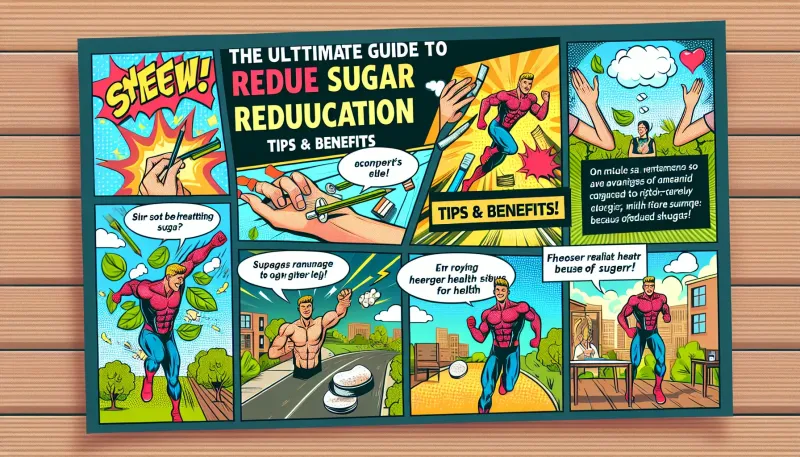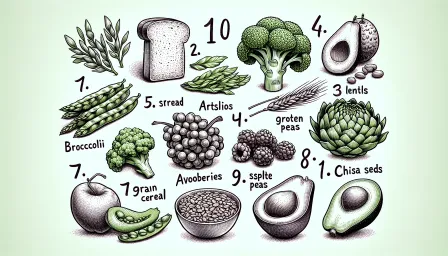The Ultimate Guide to Sugar Reduction for Health: Tips & Benefits

Discover expert tips on sugar reduction for health and the myriad benefits it brings. Learn how to effectively cut back on sugar and improve your overall well-being.
In today's health-conscious world, the detrimental effects of excessive sugar consumption are becoming increasingly evident. Reducing sugar intake is not just a passing trend but a crucial step towards better health and well-being. In this comprehensive guide, we explore essential tips and the numerous benefits of sugar reduction for health. Let's dive in and understand how cutting back on sugar can transform your life.
Why Reduce Sugar Intake?
Excessive sugar consumption is linked to a myriad of health issues, including obesity, type 2 diabetes, heart disease, and dental problems. By reducing sugar, you can lower your risk of these conditions and promote overall wellness.
Benefits of Sugar Reduction
1. Weight Management
High sugar intake is a leading contributor to weight gain. Foods high in sugar are often calorie-dense and nutrient-poor, leading to overeating and fat accumulation. By reducing sugar, you can create a healthier calorie balance, aiding in weight management and obesity prevention.
2. Improved Heart Health
Excess sugar can lead to increased triglyceride levels and higher blood pressure, both of which are risk factors for heart disease. Cutting back on sugar helps improve heart health by keeping blood pressure in check and lowering harmful fats in the blood.
3. Better Dental Health
Frequent sugar consumption is a major cause of tooth decay. Bacteria in the mouth feed on sugar, producing acids that erode tooth enamel. Reducing sugar intake can significantly improve dental health and reduce the risk of cavities.
4. Enhanced Mood and Mental Clarity
While sugar may provide a quick energy boost, it often leads to mood swings and crashes. Long-term high sugar intake is also linked to a higher risk of depression and anxiety. Lowering sugar can stabilize energy levels and improve mental clarity and mood.
Effective Tips for Reducing Sugar Intake
Read Labels Carefully
Many processed foods contain hidden sugars, often listed under different names such as fructose, glucose, and sucrose. Reading labels helps you identify and avoid these hidden sugars.
Opt for Natural Sweeteners
Instead of refined sugar, use natural sweeteners like honey, maple syrup, or stevia. These alternatives can satisfy your sweet tooth without the harmful effects of processed sugar.
Limit Sugary Beverages
Sodas, energy drinks, and even fruit juices are high in added sugars. Replace these beverages with water, herbal teas, or infused water for a healthier choice.
Choose Whole Foods
Emphasize whole, unprocessed foods in your diet. Fruits, vegetables, whole grains, and lean proteins are not only nutrient-rich but also free from added sugars.
Curb Cravings with Protein and Fiber
Protein and fiber-rich foods can keep you full longer, reducing cravings for sugary snacks. Include more nuts, seeds, legumes, and whole grains in your meals.
Practice Mindful Eating
Pay attention to what you eat and savor every bite. Mindful eating helps you recognize true hunger and fullness cues, preventing overeating and impulsive sugary snacking.
Long-Term Strategies for Sustained Sugar Reduction
Set Realistic Goals
Gradual reduction is key to sustainable sugar reduction. Set achievable goals and gradually decrease your sugar intake to allow your taste buds to adjust.
Educate Yourself and Your Family
Understanding the impact of sugar on health motivates better choices. Share your knowledge with family members to support a collective effort in reducing sugar consumption.
Find Healthier Swaps for Sweet Treats
Craving a sweet treat? Opt for healthier options like fruit, dark chocolate, or homemade snacks with reduced sugar. This helps manage cravings without derailing your diet.
Stay Hydrated
Sometimes, cravings for sugar can be mistaken for thirst. Drinking plenty of water throughout the day helps keep cravings at bay and supports overall health.
Monitoring and Adjusting Your Progress
Keep a Food Diary
Track your food and sugar intake to identify patterns and areas for improvement. A food diary provides valuable insights into your eating habits and helps you stay accountable.
Regular Health Check-ups
Regular visits to your healthcare provider can monitor key health indicators like blood sugar levels and weight. This helps you track your progress and make informed adjustments to your diet.
Conclusion
Reducing sugar intake is a powerful step towards enhancing your health and well-being. By understanding the benefits, applying effective tips, and adopting long-term strategies, you can significantly improve your quality of life. Start your journey towards better health today by making mindful, healthier choices and reaping the rewards of lower sugar consumption.



























